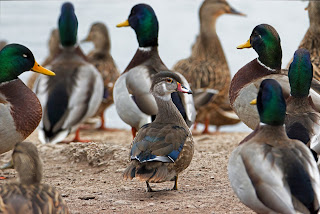NATURE
MONCTON NATURE INFORMATION LINE, Oct. 28, 2021 (Thursday)
To respond
by e-mail, please address your message to the information line editor, nelsonpoirier435@gmail.com .
Please
advise the editor at nelsonpoirier435@gmail.com
if any errors are noted in wording or photo labelling.
For more information on Nature Moncton, check the website at www.naturemoncton.com .
Edited by:
Nelson Poirier nelsonpoirier435@gmail.com
**A Forked-Tailed Flycatcher was observed
and photographed by Bernadette Kenny October 24 in Tabusintac. The photo is
attached but do not have any more details. This bird is a tropical species and a
casual vagrant to New Brunswick. A long way from home and a very welcome
striking visitor.
**Grant
Ramsey got an excellent photo of the nest of the Bald- faced Hornet on the
Riverfront Trail in Dieppe on Tuesday. It doesn’t seem to have any sign of life
around it but it is obviously one from this season. After a few killing frosts,
all the hornets in the nest will be off to heaven with the exception of the
fertilized Queen which will overwinter and start the whole cycle again next
season. It’s always a surprise to see these basketball sized nests so much in
the open that we did not notice before the leaf fall.
**Jane and
Eddie LeBlanc are/were visiting Iceland and Jane shares some photos of birds
they are/were seeing there that we potentially see here as rarities. Jane
comments the Whopper Swan is the
largest bird in Iceland. They apparently migrate from Iceland to England,
where, as soon as they land, they become the property of the Queen.
A local
told Jane they eat them, but they are very tough when mature, so they take
only juvenile birds.
Graylag
Geese were seen in 'the pond', an artificial
lake in Reykjavik beside city hall. Folks were feeding them, much as folks do
at Rockwood Park in New Brunswick.
Jane said the
Redwing is a common thrush in Iceland but creates a bird alert when one
wonders into New Brunswick.
** Brian and Annette Stone walked into Mapleton Park as
far as the large pond on Wednesday in the dull, damp, mildly
drizzly weather. It was mostly quiet with respect to wildlife, but they got
lucky at the big pond when they found 4 WOOD DUCKS mingling in with the MALLARD
DUCKS there. Two were males and 2 were females. The males did not have full
breeding plumage yet. People must be feeding them there regularly as
they came right up to Brian and Annette with the other ducks and stayed close
to their feet for a significant amount of time, likely hoping for a handout.
One other standout in the crowd on the edge of the pond was an AMERICAN
BLACK DUCK. Out in the water at the far end of the pond 4 female HOODED
MERGANSERS were trying to go unnoticed being their normally shy selves. One
other sudden addition to the bird life at the distant pond edge was a BELTED
KINGFISHER that barreled in and perched on a low branch to be photographed
... barely.
Mountain Ash,
as elsewhere, was teaming with berries. What an abundant waiting larder!
**Ticks in
New Brunswick are becoming a more significant public health issue as the tick
responsible for the transmission of Lyme disease, the Blacklegged Tick is becoming
more prevalent New Brunswick. We have up to a dozen different tick species in New
Brunswick. The Blacklegged Tick is the only one recognized as a vector of Lyme
disease. A few other species will bite humans but not recognized as Lyme
disease vectors whereas several other species will not bite humans being specific
to a particular host species. Brian Coyle is a volunteer with Search and Rescue
and recently had a tick encounter. They were in the Penfield area and suddenly
Brian noted up to 200 poppy-sized ticks on his arm. Brian got medical advice.
We were
able to look at some of the ticks under a stereoscopic microscope and Brian was
able to get some good documentary photos with his cell phone against the ocular
eyepiece that we were able to improve using Photoshop. These photos were sent
to Dr. Robbin Lindsay at the Federal Health Lab in Winnipeg. He felt they looked
like larval Moose ticks (Dermacentor albipictus) which makes real sense.
The moose is the only host of this tick and it is this time of year they seek
out their Moose host to overwinter and are very abundant. It would appear these
ticks landing on Brian was accidental. The ticks pose no harm to humans.
Some photos
of what we were able to get and improve through Photoshop are attached.
**As a
heads up, the presenter for the November Nature Moncton meeting on November 16,
the speaker on trail camera use, has been moved from December to November.
Check out the details below that will be repeated nearer presentation date:
Nature
Moncton November 2021 Meeting
Tuesday, November
16 at 7:00 PM
Trail
Camera Use
Presenter:
Brian Donovan
Zoom Link https://us02web.zoom.us/j/83818750250?pwd=SCsrOFpPNDRMTWhVZXBXNTh4VXhDZz09
Trail
cameras have opened up a new world of observation of Mother Nature’s community
that we would not normally get to sit in on.
Brian
Donovan has mastered trail camera used to a fine art and by trial and error has
collected many still photos and videos of wildlife in their own natural
setting.
Brian will
share his methods, camera use, and some of the great material he has captured.
A lot of his efforts have been in remote sections of the Renous Highway that
crosses central New Brunswick’s hinterland with a community of wildlife we
don’t often get to see.
Brian will
have a lot to share.
A don’t miss
presentation.
All are
welcome, Nature Moncton member or not.
Zoom
Link https://us02web.zoom.us/j/83818750250?pwd=SCsrOFpPNDRMTWhVZXBXNTh4VXhDZz09
Nelson Poirier
Nature Moncton

















